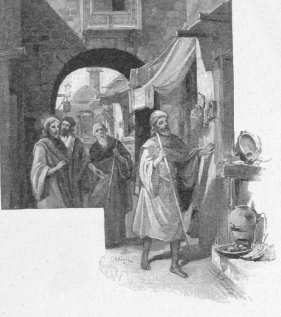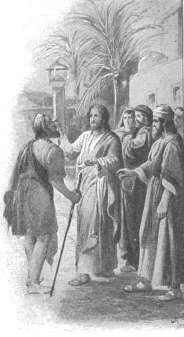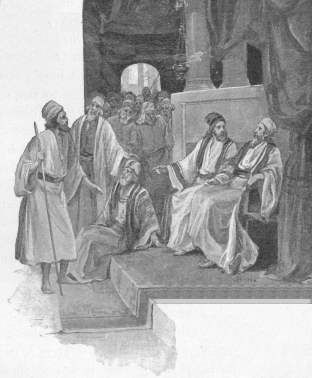The man born blind 1
Healed 6
Was he the one we knew? 8
Investigation by the Pharisees 13
His parents respond 20
Told not to give glory to Jesus 24
Jesus invites the man's faith; Spiritual blindness 35
| Text | Comments |
.1
¶ And as Jesus passed by, he saw a man which was blind from his birth.
 .2
And his disciples asked him, saying, Master, who did sin, this man, or
his parents, that he was born blind? .2
And his disciples asked him, saying, Master, who did sin, this man, or
his parents, that he was born blind?
3 Jesus answered, Neither hath this man sinned, nor his parents: but that the works of God should be made manifest in him. .4 I must work the works [actions] of him that sent me, while it is day: the night cometh, when no man can work. .5 As long as I am in the world, I am the light of the world. 2 - Who did sin? This idea of hardships coming as punishment for sin is a natural extension of the idea of earning salvation by keeping the law lu1301-5. .3 - Except for trouble we make for ourselves such as disregarding the laws of health, we cannot know why trials come. Our difficulties may provide an opportunity to witness for Christ or they may open the way for the Holy Spirit to touch a heart. 4 - Works Did you notice whose works Jesus was doing? Did the night come when Jesus couldn't work? It might seem so. He ascended in a cloud to heaven ac0109. But He has sent the Holy Spirit who enables His faithful followers to act as His agents! jn1412, ac0108. In His earlier miracle of healing the lame man, Jesus had been condemned by the Jews. The cases are similar. See on jn0517. 4 - While it is day ps10423. 4 - When no man can work "No man" includes you and me. Our work for the Lord ceases at death but, in a more general sense, human probation will someday come to an end. When, faced with the clear choice between following God or the beast, decisions will be final. No appeal will change the wicked, thus no work of witnessing. je0819f, re1609ff, re2211. |
|
 .6
When he had thus spoken, he spat on the ground, and made clay of the spittle,
and he anointed the eyes of the blind man with the clay, .6
When he had thus spoken, he spat on the ground, and made clay of the spittle,
and he anointed the eyes of the blind man with the clay,
.7 And said unto him, Go, wash in the pool of Siloam, (which is by interpretation, Sent.) He went his way therefore, and washed, and came seeing. Anointed The act was on the Sabbath v14. All but ordinary anointings on the Sabbath were forbidden by rabbinical tradition. On using remedies in connection with prayer for healing, compare 2ki2007. Go wash Probably to test his faith 2ki0510. Siloam See is0806. John explained the meaning of the name for his Greek readers. See the illustration on the Isaiah 8 page. |
|
| .8
¶ The neighbours therefore, and they which before had seen him that
he was blind, said, Is not this he that sat and begged?
9 Some said, This is he: others said, He is like him: but he said, I am he. 10 Therefore said they unto him, How were thine eyes opened? 11 He answered and said, A man that is called Jesus made clay, and anointed mine eyes, and said unto me, Go to the pool of Siloam, and wash: and I went and washed, and I received sight. 12 Then said they unto him, Where is he? He said, I know not. |
11 - Called Jesus It was a common name. He had not seen Jesus as we see from the text. The common people had no trouble seeing the power of God in Jesus. |
| .13
¶ They brought to the Pharisees him that aforetime was blind.
.14 And it was the sabbath day when Jesus made the clay, and opened his eyes.  15 Then again the Pharisees also asked him how he had received his
sight. He said unto them, He put clay upon mine eyes, and I washed, and
do see.
15 Then again the Pharisees also asked him how he had received his
sight. He said unto them, He put clay upon mine eyes, and I washed, and
do see.
.16 Therefore said some of the Pharisees, This man is not of God, because he keepeth not the sabbath day. Others said, How can a man that is a sinner do such miracles? And there was a division among them. 17 They say unto the blind man again, What sayest thou of him, that he hath opened thine eyes? He said, He is a prophet. 18 But the Jews did not believe concerning him, that he had been blind, and received his sight, until they called the parents of him that had received his sight. 19 And they asked them, saying, Is this your son, who ye say was born blind? how then doth he now see? . 14 - Sabbath Tradition forbade all but emergency medical treatment on the Sabbath. 16 - Not of God Implying that it was by satanic power. People were doing miracles by the power of Satan as they do today mt1227. The Pharisees had ample evidence of Jesus' divine calling and nature. This was an excuse to disbelieve. Miracles do not prove the divine power of the performer re1313. 16 - How ... a sinner? Thus these also disbelieved. But why might they consider Jesus a sinner? By their theory, miracles were a reward of faithfulness which was indicated by prosperity. Jesus was poor by this world's standards lu0958. |
|
| .20
His parents answered them and said, We know that this is our son, and that
he was born blind:
21 But by what means he now seeth, we know not; or who hath opened his eyes, we know not: he is of age; ask him: he shall speak for himself. .22 These words spake his parents, because they feared the Jews: for the Jews had agreed already, that if any man did confess that he was Christ, he should be put out of the synagogue. .23 Therefore said his parents, He is of age; ask him. |
22 - Put out of the synagogue The practice of assuming the authority of God in threatening to exclude nonconformists from salvation came into the apostate church. The Jews were already using a similar device. No priest has a right to do this today either. This is not to say that everyone will be saved. We must not assume the role of God. A church congregation does have a responsibility to administer church discipline or to disfellowship without implying that the individual is cut off from heaven. |
| .24
Then again called they the man that was blind, and said unto him, Give
God the praise: we know that this man is a sinner.
25 He answered and said, Whether he be a sinner or no, I know not: one thing I know, that, whereas I was blind, now I see. 26 Then said they to him again, What did he to thee? how opened he thine eyes? 27 He answered them, I have told you already, and ye did not hear: wherefore would ye hear it again? will ye also be his disciples? 28 Then they reviled him, and said, Thou art his disciple; but we are Moses' disciples. 29 We know that God spake unto Moses: as for this fellow, we know not from whence he is. |
24
- Give God the praise That is, instead of Jesus.
24 - We know ... sinner How could they be so sure? They had defined "sin." He had manufactured a clay paste and had anointed the eyes of the blind man. See verse 14 and 16. 25 - I know not He was honest and open basing his response on personal knowledge. The Jewish leaders had said "we know." The rest of the sentence was not whta the Jews wanted to hear. 26 - What did he? They apparently wanted him to talk so that they could find some reason for denying the testimony. Compare mr1311. 28 - They reviled (verbally abused) him They accused him of being a disciple of Jesus in contrast to being educated by the Jewish system as they apparently had been. The man was not impressed or embarrassed into making up answers that would please these evil men. 29 - Moses They imply that Jesus didn't follow the teachings of Moses, particularly the commandments. See le0401, le0601, ex3311, he0101. 29 - The man answered He exposed the error of these Jews. |
| 30 The man answered
and said unto them, Why herein is a marvellous thing, that ye know not
from whence he is, and yet he hath opened mine eyes.
30 - "Why, this is marvellous!" the man replied; "you do not know where he comes from, and yet he has opened my eyes!" (WNT) .31 Now we know that God heareth not sinners: but if any man be a worshipper of God, and doeth his will, him he heareth. 32 Since the world began was it not heard that any man opened the eyes of one that was born blind. 33 If this man were not of God, he could do nothing. .34 They answered and said unto him, Thou wast altogether born in sins, and dost thou teach us? And they cast him out. |
32
- Since the world began Literally, "from the age." That is
"never." It is true that there is no known healing form blindness in the
past. This argument confirms rather than denying the honor and power of
Christ.
34 - Born in sins They had lost their case that Jesus was wicked. So they turned to the physical condition that He had healed, still based on the idea that Jesus had no right to give the man a healthy body. The invalid whom they had viewed as a hopeless sinner because of his condition they were not willing to recognize as anything more. See on v2. 34 - Teach us? Another groundless accusation. They had gotten themselves into the illogical situation and he only responded to their questions. 34 - Cast him out See on v22. Although rejected by the religious leaders, this man was to receive direct confirmation of His faith from the Son of God (in the next verses). |
| .35
¶ Jesus heard that they had cast him out; and when he had found him,
he said unto him, Dost thou believe on the Son of God?
.36 He answered and said, Who is he, Lord, that I might believe on him? 37 And Jesus said unto him, Thou hast both seen him, and it is he that talketh with thee. .38 And he said, Lord, I believe. And he worshipped him. |
35
- Jesus receives those who have been cast out because of prejudice.
36 - Lord See on jn0138. 38 - He worshipped him With joy of spiritual as well as physical light. See on jn2028. Also mt1433, mt2817 |
| .39
¶ And Jesus said, For judgment I am come into this world, that they
which see not might see; and that they which see might be made blind.
40 And some of the Pharisees which were with him heard these words, and said unto him, Are we blind also? .41 Jesus said unto them, If ye were blind, ye should have no sin: but now ye say, We see; therefore your sin remaineth. |
39
- Made blind This principle is also seen in 2th0210f.
41 - Blind ... no sin We are judged for what we know and also for what we have had opportunity to know because rejecting light is itself sin. |
|
|
|
|
|
|